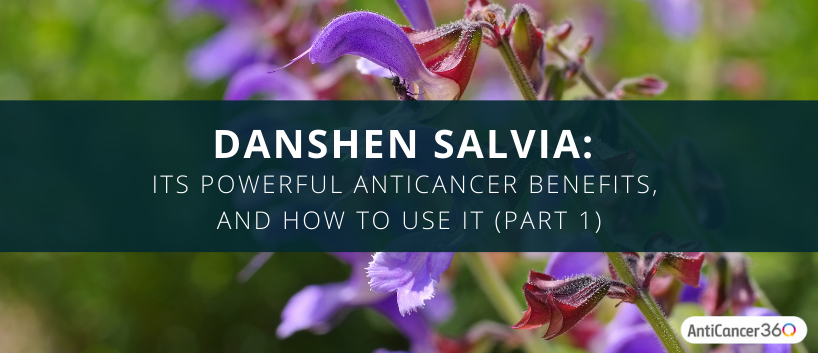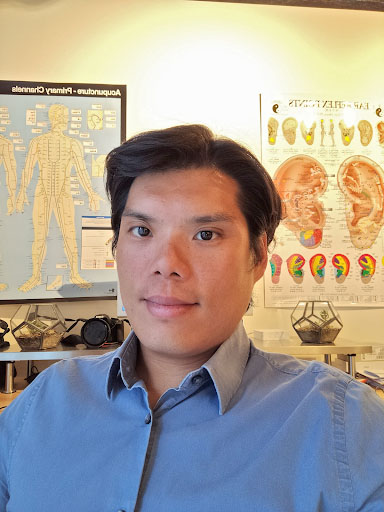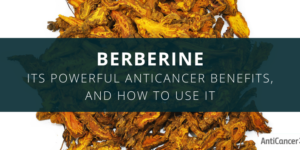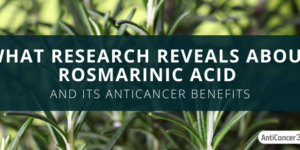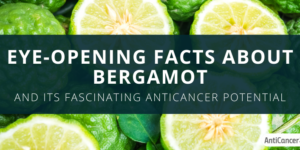When you are fighting cancer, it is essential to know about different approaches to support your body. Fortunately, there are many things you can do, in addition to your oncology treatments.
Overall, choosing an aggressive, integrated plan is especially crucial for later stage and difficult cancers. One approach is to consider adding natural supplements that have science-backed anticancer benefits.
Many potential anticancer substances may help you fight cancer more effectively. And, these natural substances can often be taken strategically, in a safe way. This integrative approach won’t interfere with (and could even enhance) your overall treatment plan.
So, in this two-part series, we’re going to look at how danshen salvia can be one of these beneficial strategies. In today’s post (Part 1), we’ll explain what danshen salvia is, how it can weaken cancer cells, and the important things to know before starting a danshen salvia supplement.
Then in Part 2, we’ll show you the research behind this unique anticancer substance and how you can use danshen to your benefit to possibly enhance the cancer-killing action of oncology treatments. Danshen may also help protect your healthy cells against some side effects of chemotherapy and radiation.
What is Danshen Salvia?
Salvia miltiorrhiza, commonly known as danshen salvia or danshen, is a plant that has been used for thousands of years in traditional Chinese medicine. Danshen, also known as Chinese sage or red sage, is extremely popular in Asia for supporting heart health. There is a huge market for danshen products in China exceeding $120 million (U.S. dollars) annually… so there’s a ton of information available on the safety profile of danshen [1].
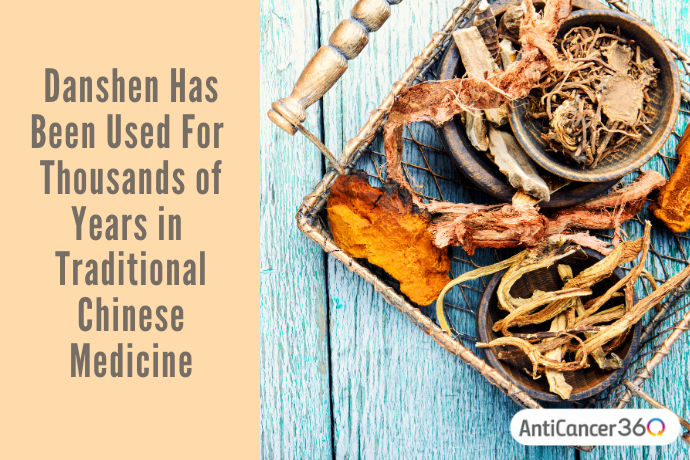
The composition of danshen salvia root is very diverse. So far, more than 100 different compounds have been identified from the danshen root. Danshen and its many constituents have also sparked the interest of cancer researchers over the last decade.
The biologically active components of danshen fall into two categories: water-soluble salvianolic acids and lipid-soluble tanshinones. The majority of danshen compounds the salvianolic acids, which dissolve in water. The tanshinones (“tans”) naturally dissolve in fats (not water). This “lipid-soluble” feature allows the tans to cross cell membranes easily [2].
Both the salvianolic acid and tans have been shown to have diverse properties, such as antibacterial, anti-inflammatory, antioxidant, antidiabetic, and, most important for today’s post, anticancer effects [3].
Cancer Metabolism Suppression: How to Starve Cancer with Danshen
Every cell in our body needs energy to survive. All cells, including cancer cells, have built-in metabolizing machinery that converts nutrients into energy. Energy is required for cells to grow, divide, multiply, and carry out vital functions.
Logically, one of the leading concepts in cancer research is exploring how to interfere with cancer cell metabolism. In other words, we want to learn how to starve cancer.
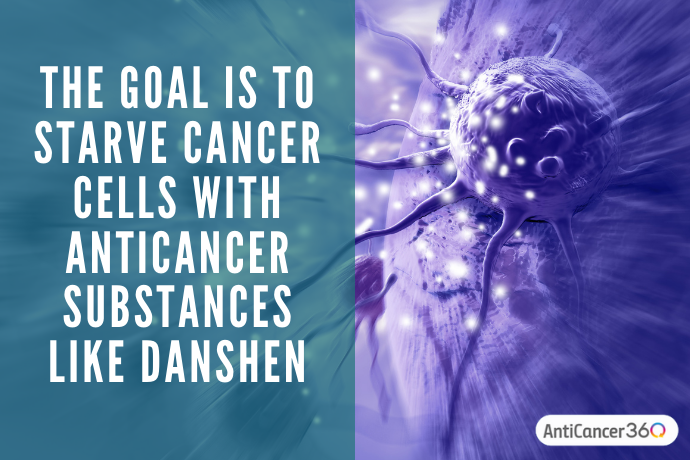
This strategy aims to block sugar, proteins, and fats from nourishing cancer cells. Like any living creature, when cancer cells are starving, they become weak. Weakened cancer cells may be more vulnerable to treatment.
Fortunately, many natural herbal substances show anticancer potential by starving cancer cells, including danshen.
Danshen May Suppress Glucose Related Cancer Metabolism
One of the most notable differences between normal cells and cancer cells is how sugar (glucose) is metabolized. In normal cells, energy metabolism mostly relies on oxidative phosphorylation (OxPhos).
OxPhos takes place in the cell mitochondria (the cell power plant). OxPhos requires oxygen to convert sugar into cellular energy, known as ATP. ATP is the primary energy source for the cells of all living organisms.
If less oxygen is available, normal cells can shift to a less efficient process, glycolysis, to convert sugar to energy. Unfortunately, but interestingly, some forms of cancer can alter their glucose metabolism to use either of these methods – – OxPhos or glycolysis – – regardless of the oxygen level available.
This altered glucose metabolism allows cancer cells to produce more energy to meet their high demand and rapid growth.
Cancer cells need more and more glucose to fuel their rapid growth and proliferation. Otto Heinrich Warburg first made this observation in the 1920s. Since then, the so-called “Warburg Effect” has inspired countless scientists to target glycolysis as a strategy to starve cancer cells [4].
Glycolysis is a process that has several steps, and a specific enzyme activates each step. Disrupting any of the involved enzymes could block the conversion of glucose to energy and lead to cell death (apoptosis). One of the enzymes that controls the glycolysis pathway is hypoxia-inducible factor-1α (HIF-1α). Which is exactly where danshen is thought to work [5].
A 2007 laboratory study explored the effects of danshen on human liver cancer cells and stomach (gastric) cancer cells. This study suggested that danshen’s anticancer activity may be due to its ability to block (inhibit) HIF-1α. The scientists observed that some of the tanshinone components of danshen were responsible for inhibiting HIF-1α. Specific tanshinones inhibit HIF-1α by directly binding to it, preventing glycolysis, which starves and weakens the cell [6].
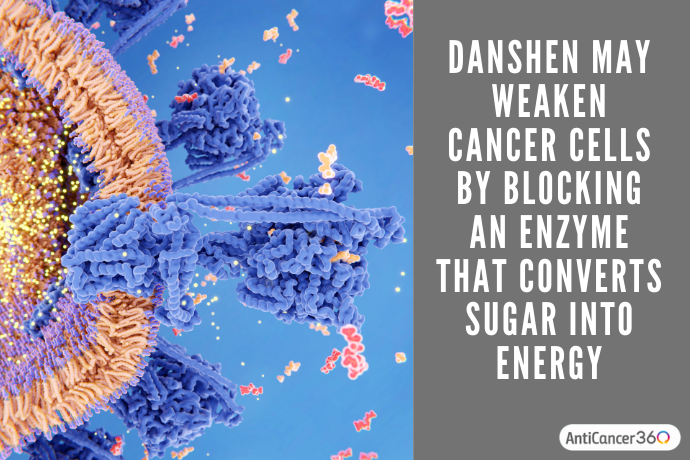
In addition to blocking glycolysis, danshen may also reduce the uptake of glucose into tumor cells. GLUT1 is an enzyme on the cell surface that transports glucose from the blood, across the cell membrane, and into the cells. In many cases, cancer cells can “upregulate” GLUT1 by increasing the number of GLUT1 transporters on their surface compared to normal cells.
In aggressive forms of cancer, an overabundance of GLUT1 helps cells absorb more glucose to fuel uncontrolled growth. Therefore, GLUT1 is a significant target in cancer treatment [7],[8].
In a 2017 study of cervical cancer in mice, danshen treatment was compared to cyclophosphamide, a chemotherapy drug. The results showed that danshen was slightly more effective:
- Cyclophosphamide treatment reduced tumor size by ~65%.
- Tan IIA treatment (a component of danshen) reduced tumor size by ~73%.
The researchers’ analyzed the molecular mechanisms and found that Tan IIA not only prevented glycolysis by blocking HIF-1α, but the presence of GLUT1 was also downregulated [9].
Overall, danshen salvia reduces sugar uptake into cancer cells and blocks the enzyme that converts sugar into energy. But it can also help against cancer in other ways. So let’s take a look at some of danshen salvia’s other anticancer actions.
Danshen May Disrupt Cancer Glutamine Metabolism
Unfortunately, cancer cells are good at adapting. And, if a cancer cell is starved of glucose, it can tap other energy resources like protein and fat.
Proteins have numerous essential functions in our bodies. Proteins are also made up of amino acids: the structural building blocks of proteins. The most abundant amino acid is glutamine.
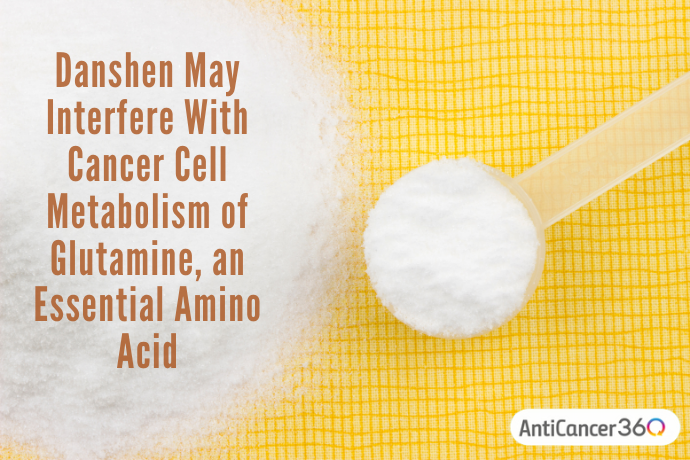
Due to their rapid growth and high metabolism, tumor cells have ravenous appetites for high levels of glutamine. So, exploring ways to interfere with cancer glutamine metabolism is a hot pursuit of cancer research and drug development. And, danshen may play a role in interfering with cancer’s metabolism of glutamine.
Glutamine metabolism involves an enzyme complex found in all mammalian cells known as mTOR (mammalian target of rapamycin). mTOR is the master controller of cell growth, proliferation, survival, and is involved in new blood vessel formation (angiogenesis) [10].
In 2016, an interesting laboratory study explored the effects of a specific tanshinone, cryptotanshinone, on mTOR activity. Cryptotanshinone blocked the effects of several enzymes such as IGF-1, stat3, NF-κB, Akt, VEGF, and small GTPases, all of which are regulated by mTOR, directly or indirectly [11]. Scientists confirmed their hypothesis that the anticancer activity of cryptotanshinone was the consequence of inhibiting mTOR.
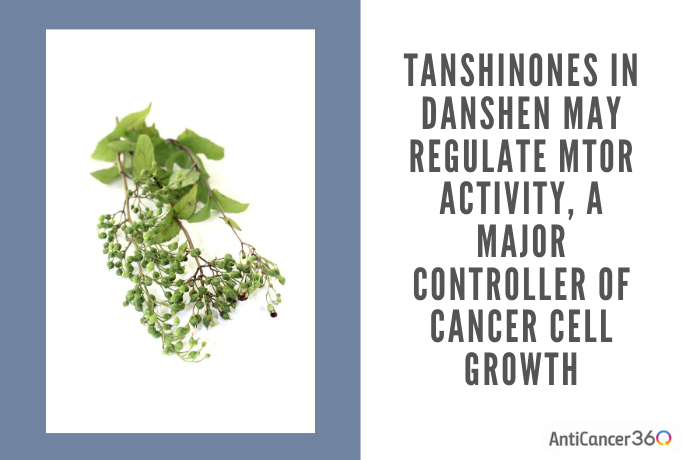
These researchers observed that other tanshinones (tan I, tan IIA, dihydrotan) did not affect mTOR, but cryptotanshinone did. Interestingly, taking the whole danshen extract by mouth, in comparison with cryptotanshinone alone, increased the blood levels of cryptotanshinone by about 8 fold, suggesting that an interaction may occur between the coexisting compounds. These interactions within the whole danshen extract may beneficially increase tanshinone absorption [12].
Although it may not seem directly cancer-related, danshen has also shown promising therapeutic benefits for pulmonary fibrosis through its effects on glutaminolysis. Glutaminolysis is a process used in cell mitochondria to make energy (ATP) by breaking down glutamine.
Pulmonary fibrosis (PF) is a condition characterized by progressive shortness of breath, cough, with inflammation and stiffening of the lung tissues. At the cellular level, PF worsens with continued oxidative stress [13].
Oxidative stress activates myofibroblasts that are present in both healthy and diseased tissues. With diseases such as PF, myofibroblasts become overactive, depositing thickened connective tissues, which leads to organ damage and dysfunction [14].
In a study published in 2019, researchers observed that a specific tanshinone (Tan IIA) can suppress reactive oxygen species (ROS) which reduces activation of myofibroblasts. The researchers’ analysis revealed that Tan IIA suppressed ROS by blocking glutaminolysis. Instead, tan IIA redirected glutaminolysis to increase the production of glutathione, a major natural antioxidant. Ultimately, myofibroblast activation was prevented by Tan IIA [15].
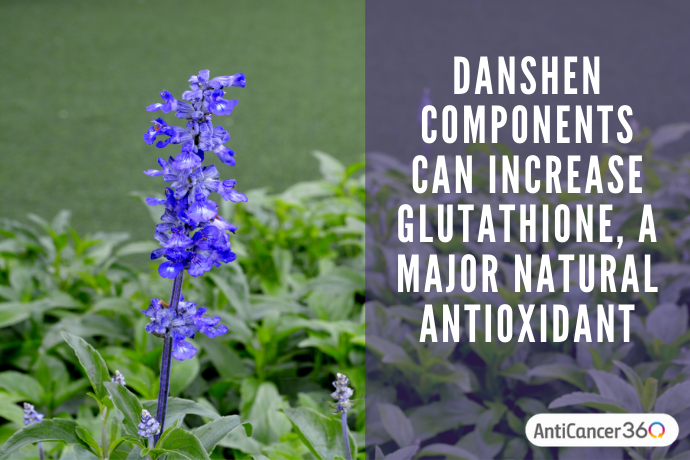
This finding makes danshen salvia even more compelling as a useful anticancer compound since cancer cells also utilize glutaminolysis to create energy. And, if danshen could help the body increase its natural defense against oxidative stress, it may potentially help many conditions that are worsened by inflammation, including many cancers.
Danshen Can Interrupt Cancer Metabolism of Fats
Fat (including cholesterol) has many vital roles in the human body. Cholesterol for example, serves as an energy source, a precursor of hormones and vitamin D, and is the structural unit of cell membranes.
The metabolism of fat affects many essential cellular processes, including cell growth, proliferation, and survival. The reprogramming of fat metabolism critically contributes to cancer formation and progression. So, cholesterol synthesis has become a valuable target for researchers exploring new ways to fight cancer.
Cholesterol in the blood comes from two sources: natural production by the liver and from some diet, if it includes meat or dairy products. High cholesterol levels, from foods or excessive production, can lead to serious heart problems and could potentially support cancer growth [15].
The mevalonate pathway is the liver’s natural process for making cholesterol. The first step in this pathway is performed by the enzyme HMG-CoA reductase. The danshen component salvianolic acid C has been shown to block HMGR, similarly to the popular cholesterol-lowering “statin” drugs (e.g., atorvastatin), although not as strongly [16].
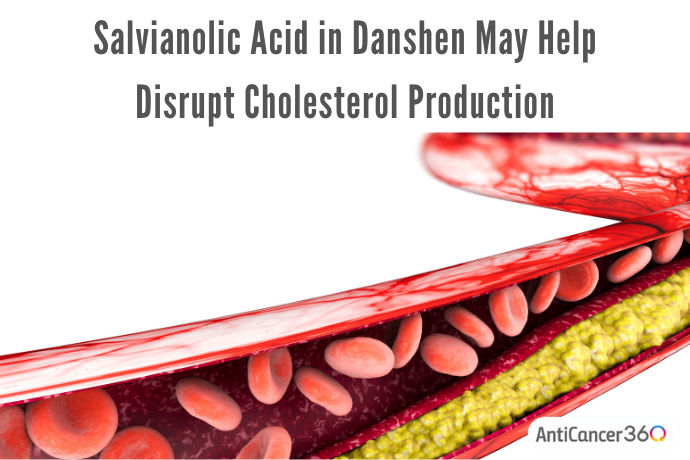
The potential effects of salvianolic acid C were examined in a lab study that compared various HMGR-inhibiting herbs to atorvastatin. Atorvastatin showed a pronounced anticancer effect on human liver cancer cells. But, the danshen component did not show an anticancer effect… and even seemed to slightly improve cell viability [17].
The researchers stated that the natural solubility of salvianolic acid C may have been a limiting factor. This is likely because salvianolic acid C dissolves in water, not in fats which cell membranes are mostly made of [18].
However, new formulations of danshen can help overcome danshen’s natural physical properties that limit its absorption. In 2016, a new “self-microemulsifying” system was developed to load the various constituents of danshen salvia into a single drug delivery system and improve their oral bioavailability [19]. (“Oral bioavailability” refers to how much of the substance makes it to the bloodstream after being taken by mouth and passing through the digestive system.)
Overall, danshen may help prevent cancer cells from converting fat into energy, ultimately weakening the cells.
Danshen Salvia as Part of the Aggressive Integrative Approach to Cancer Treatment
How To Take Danshen: Dosages, Side Effects, and Precautions
Dosage
Danshen salvia comes in various forms: oral tablets, capsules, granules, liquids, sprays, dripping pills (dissolve under the tongue), and injections. The recommended dosages are highly variable, depending on the form and the reason for its use. Danshen salvia is often recommended to be taken 2 to 3 times per day [20].
One common way to determine dose is by body weight: 6.56 mg danshen salvia per kilogram (kg) of body weight [21]. So for example, a man who weighs 76 kg (167 lbs.), he could take 500 mg per day, up to 2 to 3 times per day.
Side Effects
Danshen is generally considered safe and well-tolerated.
Possible side effects have been reported with danshen salvia and may include:
- itchiness
- upset stomach
- reduced appetite
- drowsiness*
- dizziness*
- low blood platelets*
*Some of these side effects were reported in clinical studies by people who were also taking other medications or supplements. So it isn’t known if these effects were due to danshen or other substances [22].
Interactions with Drugs and Supplements
Danshen has some possible drug interactions. Many unknown potential interactions can happen with danshen, especially with chemotherapy and other supplements or medicines. This is not a comprehensive list of possible interactions, but some include [23]:

- Digoxin. This combination is not recommended. Danshen salvia is structurally similar to the heart medication digoxin. Using danshen with digoxin might cause dangerous effects on the heart such as arrhythmias.
- Drugs or Herbs that Increase Bleeding Risk. Danshen might increase the risk of bleeding due to its possible blood-thinning effects. Precaution should be taken to monitor for signs of bleeding (like bruising easily) if you also take other blood-thinning medications (e.g., aspirin, Plavix, warfarin, Xarelto), or herbs (e.g., feverfew, garlic, ginkgo).
- Herbs or Drugs with Blood Pressure Lowering Effects. Danshen extract compounds can support lower blood pressure. People taking blood pressure medicines (e.g. amlodipine, lisinopril, losartan) or herbs that can also lower blood pressure (e.g. andrographis, stinging nettle) should use caution. Monitor your blood pressure daily and let your healthcare professional know if you feel light-headed. Dose adjustments by your doctor may be necessary.
- Herbs or Drugs Metabolized by Certain Liver Enzymes. Danshen extract might slow down or speed up the activity of specific enzymes that are responsible for metabolizing some medicines and herbs. These enzyme interactions can lead to increased side effects of certain medications, or decreased effectiveness of others. Your doctor may need to adjust your dose of medications that could interact.
Before starting danshen, or any natural supplement, you must consult with your healthcare provider.
Will Danshen Salvia Strengthen Your Personal Battle with Cancer?
Overall, there can be many potential benefits to adding a natural dietary supplement like danshen to your anticancer program.
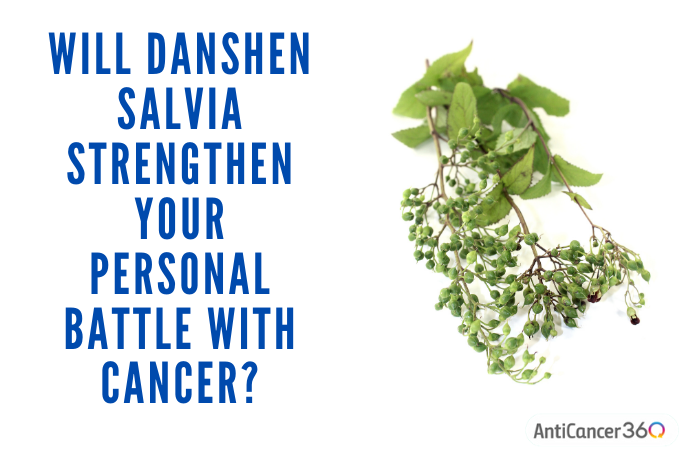
When using the “Aggressive Integrative Approach” to cancer, the goal is to fight cancer from every possible angle. This approach includes integrating science-backed natural supplements to fight cancer, despite limited human studies. And, to use them in a safe way that won’t interfere with your oncology treatments.
Additionally, some natural supplements may help reduce side effects and improve the success of oncology treatments. And we can guide you on the appropriate use of natural substances with potential anticancer benefits to support your body from every angle.
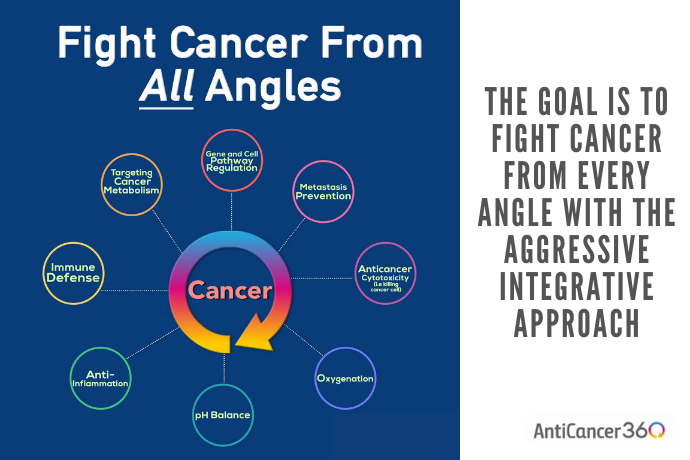
So now we’d love to hear from you. How are you approaching your treatment plan? Are you taking any supplements? Have you tried danshen, and what has your experience been like so far? Let us know in the comments below!
If you’re interested in using an Aggressive Integrative Approach for your case… you can learn more about our program by watching one of our free online webinars.
Please discuss the risk-versus-benefit potential with your healthcare professional before starting any natural supplement, including danshen.
Are You A Candidate For Our Program?
If you’d like to learn more about the AntiCancer360 approach and see if we can help you… please watch our free online webinar to learn more about our approach. Then at the end, you’ll be able to schedule a free call with someone from our team so that we can discuss your case in more detail.
Dr. Patricia Weiser is one of AntiCancer360’s consultant pharmacists, science advisors, and medical writers. Her expertise helps us create safe herbal and supplement combinations and avoid potential drug interactions.
Patricia is a graduate of the University of Pittsburgh and a licensed pharmacist. She has clinical experience in both community and hospital pharmacy. She is passionate about integrative and preventative care and strives to empower her patients to take an active role in their health.

